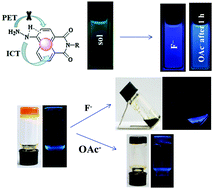An “off–on” fluorescent naphthalimide-based sensor for anions: its application in visual F− and AcO− discrimination in a self-assembled gel state†
Abstract
A novel fluorescent organogelator (Y1) with both photoinduced electron transfer (PET) and intramolecular charge transfer (ICT) characteristics was designed and synthesized. The gelator Y1 could selectively recognize and discriminate fluoride and acetate ions in both solution and gel systems. Interestingly, addition of F− to the Y1 solution resulted in a dramatic enhancement of the fluorescence intensity and an obvious change in fluorescence color. However, the fluorescence intensity and color of the Y1 solution were strongly dependent on time after the addition of OAc−. Moreover, the organogel treated with F− experienced a quick gel-to-sol transition, while only color and fluorescence changes were observed without gel collapse after adding OAc− to the gel system. The sensing mechanisms were studied by 1H NMR, SEM and spectroscopic experiments.



 Please wait while we load your content...
Please wait while we load your content...